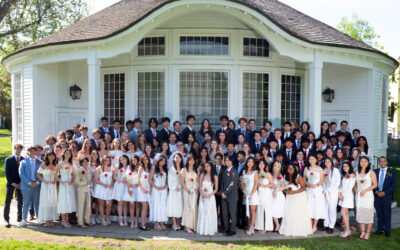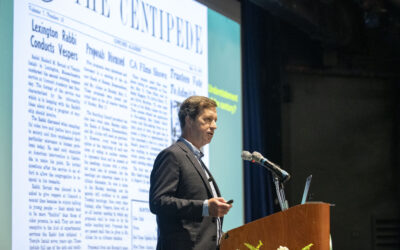Concord Academy Interim Head of School Sarah Yeh P’24 delivered this chapel talk on January 28, 2021:
Hello, everyone. Thank you for being here listening today — I’m grateful for the opportunity to be here with you, to share some reflections from recent weeks.
First a story, about my introduction to chapels as a prospective CA community member.
I was teaching history in New York City while also trying to raise an adorable toddler, which anyone can tell you is no easy task, and so my husband and I had made the decision to relocate closer to family in Massachusetts. Knowing of the school’s phenomenal reputation, I had come to CA on a cold winter’s day to spend the day interviewing for an open history position. I arrived bright and early, not overdressed, but certainly in some nice interview clothes and not so comfortable shoes. I was met by Kim Frederick from the history department and we went back to her office to talk — you can probably picture how that went. Two people who love history and love teaching — pretty soon we were yapping away about what we thought was really important in the teaching of history, when all of sudden Kim leapt out of her chair and blurted out some kind of endearing expletive. I sat there confused. She looked at me, looked down at my feet, and said, “Can you run?”
“Um, sure?” I replied.
She jumped for the door and I followed out into the hallway, walking swiftly behind her. She turned around to look at me, “No I mean, seriously, can you run?” and she took off. I dutifully took off after her. As we hit the door to get outside, I could hear a bell tolling. Kim started to run faster, and turned to cry out, “If we don’t get there before the bell stops ringing, we’ll be shut out.”
“Shut out?” I thought, “really?”
Sure enough, as we ran down Chapel Way, me clattering along in whatever dressy pair of slippery shoes I had worn that day, I could see the Chapel doors closing. One side closed. Kim ran faster. The other side started closing as we were approaching, and just in the nick of time, Kim valiantly threw her body into the narrowing aperture and squeezed me through.
We quickly took a seat, and I had the privilege of experiencing a beautiful CA chapel. It was everything you have come to know about senior chapels — funny, moving, thoughtful, heartfelt. I loved it. I felt like I had found my place. Whenever I think back on that day, I think about how:
- I’m grateful that I ran and that Kim is Kim.
- My initial reactions on that frantic run were so shaped by institutions I’d learned or worked in before. I remember thinking, “We’re teachers, why wouldn’t we just sneak in the back?” and “What is up with this place, and the bell, and the doors closing?” Because I had not yet come to understand the place of chapels at CA or how CA operates as a community.
- Chapel has become so emblematic for me of how we are all committed together to this project that is CA — it is founded on trust and mutual respect. On chapel mornings, we give ourselves over to our seniors, to hear their stories and insights, and we show up for them and for one another. And it doesn’t matter what your role at the school is, or what legitimate obstacle may have prevented you from getting to chapel on time — you will still end up outside, in the cold, listening through a speaker in the talking rock, until there is a chance to enter the Chapel without disruption. No one sneaks in the back, and everyone is a valued presence.
I know that pandemic has painfully gnawed away at some of the chapel experience, but thank you to all of you for not letting it crush the spirit. I continue to be daily moved by our seniors, their words and their thanks, and the community that comes together to support them.
***
In moments of historian nerdiness lately, I’ve been thinking quite a bit about the challenges of trying to understand and make sense of history while you’re living through it. If you look back at millenia of human civilization, we have a few key imperatives that set us apart as humans. Of course we have basic impulses to ensure personal survival and survival of the species, but beyond that, we have tended to have an inherent drive and need to do three things:
- Understand and explain the world around us, whether that is through mythology or through science.
- Create — we have an inherent human impulse to create — art, music, literature, invention.
- Know what came before us and leave a record of our presence — what I like to call the historical imperative.
So we are all, at our core, philosophers, artists, scientists, and historians, whether we recognize it or not. And I think it is particularly hard, as inherent historians, to be living in this time where we so want to be able to place what we’re feeling and experiencing — we want to know how it’s going to end up: Are we living in a blip, are we standing on the precipice of catastrophe, are we on the verge of an era of unprecedented progress, or something somewhere in between? We don’t know, we can’t know, and we want to know. It’s human nature, and it’s a human imperative. And part of me feels like over the last year there is this low-level hum of historical anxiety that we’re all carrying with us day to day, and in moments of crisis, whether it’s witnessing COVID suffering, seeing violence or injustice in your community, or what happened January 6, it all comes crashing to the surface.
When the new year rolled around, and people were talking about how horrible 2020 was, the Washington Post published a story about a poll asking a bunch of notable historians where they would rank 2020 relative to other years in history. By the way, this seems to be a thing, that whenever something big is happening, everyone calls up the historians to somehow rank things. It always seems to me an impossible endeavor.
When it came to placing 2020, the historians all pretty much agreed that 2020 was not the worst year in history. The headline said “worst,” but the study actually asked historians about the most “stressful” years in history. 2020 ranked sixth in world history, and eighth in U.S. history, coming in behind 1348, 1944, 1862, 1918, 1968, 1929, 1838, and 2001, among others. As I read the article, I struggled not only with the notion of trying to catalog human stress and suffering but also with the idea of placing 2020 in historical context. For me, 2020 isn’t history; it’s current events. Of those dates I just listed, I’ve only lived through one of them, and so 2001 is perhaps my lens into living through history versus coming to understand it later. I remember 2001 in vivid detail, and 20 years later I can, with hindsight, look back and contextualize it in a way that was impossible to do in 2001, or even in the decade that followed. And yet still I feel we are only at the surface of understanding the impact of 2001 and the U.S. policies that followed, in this country and in the world. How can we possibly understand what we’re going through right now?
There’s a reason why I am an early modern historian, why I dig into the world of the 1500s, 1600s, and 1700s. I started out thinking I would be a 20th century Russian historian, but with every history course I took, I kept feeling like I needed to go further back to understand how things got to where they were. So I went earlier and earlier until I hit the early modern period, when I started to say, “OK, now I see how we got there” — and I took a medieval course and realized, “Yup, and this is what came before.” For me, the history of the early modern period is that key place where you can see what came before, you can highlight the critical moments of change, and you can see the legacy those moments left. That’s where I’m at home as a historian — it stands to reason I’d have trouble trying to make sense of 2020.
But that doesn’t mean we all won’t try, and that doesn’t make it any easier to live through it. OK, you may be saying, thanks Sarah, that’s not particularly helpful. That’s true. I like to think that 2020 will ultimately be seen as a year that was a catalyst for change, for rights, for justice, for peace, for the planet. Time will tell. So what are we to do now? I try to look for the places where I can have an impact, large or small, knowing that small impacts build together over time to drive change, even if I can’t see it in the moment. And I try to be compassionate to myself and to others.
Over the winter break, I was feeling in need of some inspiration, so I turned to my grandfather’s journals. I had so much love and respect for him as a young person, and I wish I had had more time to have philosophical conversations with him as an adult. But I do have the gift of his journals, in which he wrote daily for 60 years. I decided in December that I would start at the beginning and gradually read my way through — everyone needs a pandemic project. They begin in 1938, when he was a college freshman in Michigan. For some reason, he had sought out a dean to have a conversation, and he left deciding to “pull myself up by my bootstraps and keep a journal.” I wish I knew what that conversation was about — based on later entries, I suspect it involved my grandfather struggling with whether he should continue on at school. He questions whether he belongs at college, whether he should have stayed home to work as a mechanic, or take an automobile factory line job in the city. He decided to stay, but as 1938 went on I could see him struggling, in the life of a student living through history. It made me think a lot about CA. He spent hours and hours reading — reading newspapers, reading on philosophy, socialism, justice, religion — and listening to the radio, to whatever news broadcasts he could get to understand what was happening in Europe. He cried out in his journal about atrocities in Germany and the hypocrisy of the United States with its own antisemitism and racism; he joined student associations; he talked with his friends late into the night about war. What he did not do was write his English papers, or study sufficiently for his math test. One night in March he wrote the following:
“Hitler marches into Austria. … Why are we at college? …The irrelevance of it for me to work over tangents to a parabola when men are killing each other and women and children are homeless and poverty-stricken. Or other men beat down and tread on their fellow man just in order to satisfy their own selfish desires.” A few days later, he failed his math exam. He wrote to himself: “I may have failed a math test, but I have gained the test of life and values.” And then he went to talk to his math professor to help him figure out how to balance the weight of the world, and math. On the next test when he got an 80, he took it as a “moral victory.”
I tell you this not to encourage you to fail tests, but to say that we, the adults in your life, understand what you are carrying. Reach out for help. We want to help you balance the work with the struggle, even as we don’t always necessarily do it well ourselves. And one thing I see so clearly in my grandfather’s pages and pages of agonizing over where he should be devoting his energy and chastising himself for his perceived failures, is what he could not see as he was living through it. None of it was irrelevant, from the parabolas to the English paper, to the student activism — it was all the start of a journey. He would go on to spend a lifetime dedicated to human rights, social justice, and peace. At 18, he couldn’t know that would be the case — all he could do is worry he wasn’t doing enough. Be compassionate with yourself. You are living through history, it will shape you in ways you cannot predict now. Look for the places to make a difference, and don’t forget to acknowledge the small moral victories.


